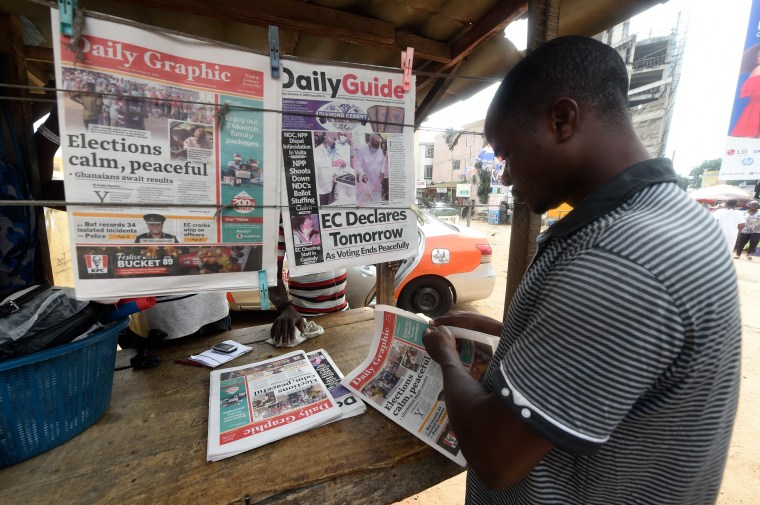At least five Ghanaian journalists were separately harassed or threatened with death over their coverage of the country’s December 7, 2020, general elections, according to news reports and journalists who spoke with CPJ by phone and messaging app.
In mid-December 2020, following the elections, Kevin Taylor, the founder of the Loud Silence TV YouTube channel, uploaded a video threatening Afia Pokuaa, an anchor and program director with the privately owned Despite Media conglomerate, according to Pokuaa, who spoke to CPJ in a phone interview, and a copy of the video, which CPJ reviewed.
Loud Silence TV features entertainment and cultural content, as well as political commentary supportive of the opposition National Democratic Congress party, according to CPJ’s review of its uploads.
In the video, Taylor expresses anger at Pokuaa’s coverage of the election results, and says in the local Akan language that Pokuaa needs “to die before the country gets destroyed” and “if care is not taken, you will die in two weeks.”
Pokuaa told CPJ that she did not know exactly when the video was first uploaded; it has since been taken down from YouTube, but clips have been shared by local news outlets. None of Loud Silence TV’s videos posted since November 2020 remain publicly available on its YouTube page.
Pokuaa said she fled the country in December in response to the video and a flood of threatening messages sent to her Facebook account and to the accounts of her friends from unidentified National Democratic Congress supporters; she said she returned to Ghana in the first week of February.
CPJ called Loud Silence TV at two phone numbers listed on its website and social media, emailed the address listed on its website, and sent a message to its official Facebook page, but did not receive any responses.
On December 25, freelance investigative journalist Manasseh Azure Awuni received two emails signed by Charles Nii Odartei Bannerman, threatening him over a December 24 report he wrote for the privately owned news website MyJoyOnline about the National Democratic Congress’s attempt to contest its electoral losses, according to the journalist who spoke by phone with CPJ and a report by Myjoyonline.
One of the emails, which CPJ reviewed, read, “If condition demands that we eliminate rats like you, we will not relent . . . don’t forget Ahmed Suale’s death,” in reference to Ghanaian journalist Ahmed Hussein-Suale Divela, who was murdered in January 2019.
Awuni told CPJ that he reported the threats to police on December 27 but had not heard back from them as of February 23. He said he did not know anyone named Charles Nii Odartei Bannerman.
On January 2, in La, an area within Ghana’s greater Accra region, two unidentified men verbally threatened Phillip John Quartey, an anchor with the privately owned broadcaster Metro TV, according to Quartey, who spoke to CPJ in a phone interview, and a report by Metro TV’s news website, Asaaseaban.
The men exited an unmarked car and told Quartey, “We will kill you and that stomach journalist at Metro TV for his unprofessional job,” referring to the another Metro TV journalist using a colloquialism implying the journalist was greedy.
“Nobody can do anything to us, go and tell him, we are still watching you guys,” the men said before leaving, Quartey told CPJ. He requested that CPJ not name the other Metro TV journalist who was threatened, citing security concerns.
The threats came in response to Metro TV’s coverage of the election in its current affairs program “Good Evening Ghana,” Quartey told CPJ, adding that he has never appeared on Good Evening Ghana, but believed he was targeted because he was wearing a Metro TV shirt.
Quartey told CPJ he submitted a written report of the threat to the local police on January 4, but said he was unaware of any progress as of February 23.
On January 5, an unidentified man broke into the office of the privately owned radio broadcaster Zylofon FM in Legon, a suburb of Accra, and searched for Ahmed Abubakar, an anchor at the broadcaster, according to Abubakar, who spoke by phone with CPJ, and a report by the Ghana-based press freedom group The Media Foundation for West Africa.
Abubakar, also known as Blakk Rasta, said he was discussing the election on his program, “Taxi Driver,” when the man arrived at reception and identified himself as a member of Ghana’s national security organization before running through the building calling out Abubakar’s name.
Abubakar said the man did not find him because the lights in the studio were turned off, but the attacker pepper-sprayed a technician in the production room and vandalized the station’s equipment, causing it to go off the air.
According to Abubakar and a report by the privately owned Modern Ghana news website, a security guard shot the man as he tried to escape through one of the production room’s windows, and police then arrived they took the attacker to the police hospital in Accra, where he recovered and then escaped. Abubakar told CPJ on February 23 that the man was still on the run.
Sheila Kessie Abayie-Buckman, a spokesperson for the Ghana police, said via messaging app that she was unable to give CPJ any updates on investigations into the threats journalists had received “due to data protection laws.”
CPJ called and texted National Security Minister Albert Kan Dapaah for comment, but did not receive any responses. CPJ messaged and called Sammy Gyamfi, a communication officer for the National Democratic Congress for comment, but he did not respond.
